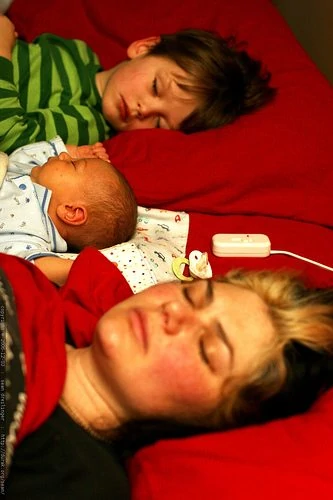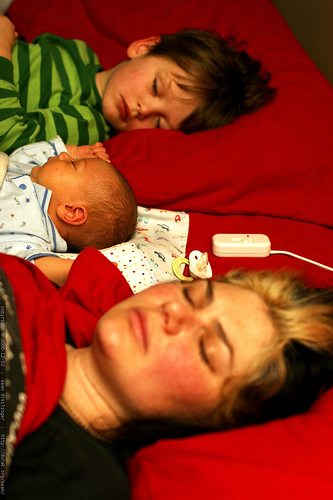sean dreilinger/Flickr
In our book Yoga Calm for Children we write:
When we rest, the body heals and the mind and body integrate experiences. Rest allows us to reflect on the day and notice the effects of our activities on our emotions, mind, and body. In rest, free of distractions and stimulation, we are able to dream, to imagine, to work on solutions to our daily lives.
Sleep deprivation, on the other hand, can negatively affect mental performance, muscle control, and mood. Furthermore, strong, mounting evidence indicates that lost or damaged sleep is associated with serious long-term health problems including heart disease, diabetes, viral infection, cancer, depression, and substance abuse.
Adequate sleep and rest are important not only for growing bodies but also for mental development and emotional health. Scientists believe that sleep helps to weave disparate, emotionally fragmented, or weakly coupled memories together into coherent structures that the brain can then use more effectively during wakefulness. The more complex the physical or mental experience, the more important sleep is for efficiently integrating and remembering the experience.
Sleep deprivation is a significant yet often hidden health issue. In Healing Night, Rubin R. Naiman notes that, in recent years, the amount of sleep adolescents get has been reduced by two or more hours a night. (According to the National Sleep Foundation, school age children need 10 to 11 hours nightly for good health, with teens needing 9 1/4 hours.) This affects children’s health on many levels. For example, a lack of sleep often results in increased consumption of high calorie foods and caffeinated products, which can trigger behavior problems and mental health conditions like ADHD.
Good sleep is important for adults, too – and for the same physiological and psychological reasons. But when it comes to the hows, many of us are stumped.
So here are 10 tips for getting better sleep:
- Relax before retiring. Take some time for a pre-sleep ritual to break the connection between stress and bedtime. Listen to some calming music. Meditate. Read a bit. Do some light stretching. Try some lavender aromatherapy or a hot bath. But remember, TV watching and bright lights can interfere with our bodies’ natural release of melatonin – the hormone that helps us to fall asleep.
- Make the routine routine. Go to bed around the same time every night. Your body will learn that time is bedtime and relax accordingly, especially if a regular bedtime is in conjunction with some relaxation ritual as described above.
- Remember the purpose of the bed. Avoid TV, reading, eating and emotional discussions while in bed. The mind and body associate bedtime activities with being in bed. So don’t let a bad habit keep you awake.
- Eat right and sleep tight. Avoid eating a large meal just before bedtime or going to bed hungry. It’s about balance. Also, when possible, opt for foods that promote sleep, such as milk, tuna, pumpkin, artichokes, avocados, almonds, eggs, peaches, walnut, apricots, oats, asparagus, potatoes and bananas.
- Watch the caffeine. Coffee, most sodas and many teas contain caffeine and may keep you up. If you’ve already had too much, consider eating some carbohydrates like bread or crackers to counter the effects. Adults should also watch alcohol intake, for although it may help you fall asleep, it can also cause sleep-disturbing nightmares, sweats and headaches as your body clears the alcohol from your system.
- No drinks after 8 p.m. To enjoy sleep uninterrupted by bathroom breaks, shut down your fluid intake early.
- Exercise at the right time. Regular exercise relieves stress and encourages good sleep. However, if a little exercise really gets your blood pumping, you’d be wise to avoid working out in the evening or just before bedtime.
- Cut down on noise, light and extreme temperatures. Try earplugs, a night light, an eye mask or drape clip. The best temperature for sleep is 68° to 72°F.
- Understand jet lag. A few days before you cross time zones, try waking up later or earlier as needed, to help your body adjust to the time difference. It takes a few days for your body to fully adjust.
- Nap smart. A 20 minute power nap early in the day can really refresh you. But sleep too much, and you may spend the night staring at the ceiling.






